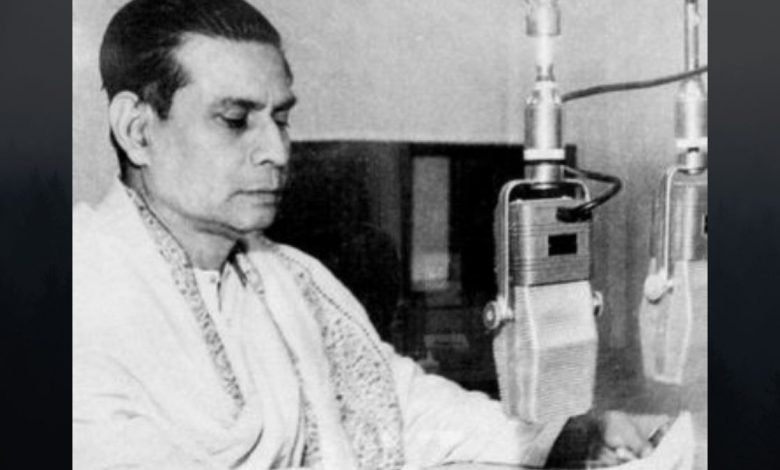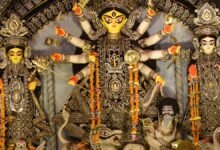The legacy of the voice behind ‘Mahishashura Mardini’, Birendra Krishna Bhadra

In 1976, when AIR aired the new version of the classic Mahishashura Mardini voiced by the superstar Uttam Kumar, replacing Birendra Krishna Bhadra’s sonorous voice, angry listeners started stoning the national radio office.
If there is one festival that Bengalis adore is Durga Puja. The five-day festival brings the state to a halt. And on the auspicious occasion of Mahalaya, the earth wakes up to the arrival of Devi Durga to fight the evil forces.
For a Bengali, the dawn of Mahalaya is a little different. They wake up at four in the morning and tune in to the old radio set for Birendra Krishna Bhadra’s Mahishashura Mardini. The sleepy children who will barely be up for the first 10 minutes of the program are shaken vigorously to wake up by tireless parents year after year. Some family members will huddle in the living room while the young ones quarrel to get the closest seat to the radio. Meanwhile, other members will stay in their room with the radio playing at its peak that pierces the walls to reach the end of the street, only to be mixed with the same notes wafting their way from the other end.
The old and gigantic radio sets might have given a pass to YouTube and other modern gadgets, but the old classic voice still did not lose its charm. People still listen to the same Birendra Krishna Bhadra’s rendition of Mahishashura Mardini. It is the radio adaptation of the tale of Devi Durga’s arrival on the earth to kill Mahishashur, the demon king.
Who is Birendra Krishna Bhadra
Birendra Krishna Bhadra was born in Kolkata in 1905 to a linguist father and a homemaker mother. He was a playwright, actor, narrator, and theatre director from the city and was known as a contemporary of Kazi Nazrul Islam and Pankaj Mallick.
He was an employee of All India Radio, the national radio of India. Starting from the early 1930s, Bhadra adapted and produced several plays for radio broadcasting. Today, he is fondly known for his soaring Sanskrit recitation in one of the oldest radio shows, Mahishashura Mardini, first broadcasted in 1931 by AIR Calcutta (Kolkata) on the dawn of Mahalaya, at 4.30 am. The nostalgic tradition is followed every year and will continue to be followed for the next century, if not more.
He had also acted and wrote the screenplay for the film ‘Nishiddha Phal’, released in 1955. In 2006, on the day of Mahalaya, his daughter Sujata Bhadra got a cheque for Rs 50,917 from Saregama India as a royalty for her father’s famous work.
Birendra Krishna Bhadra’s legacy
Every Bengali, be it a 60-year-old grandfather or his five-year-old grandchildren, all are synonymous with Bhadra’s Mahalaya classic. The popularity graph seems to be peaking upwards with every passing year. His version was so popular that the audience did not like the Bengali superstar Uttam Kumar’s voice chanting the ‘Chandi Path’ in the late 1970s, despite the actor’s soaring popularity.
The legacy of Bhadra’s sonorous voice still makes people set the alarm at 4.30 am on the dawn of Mahalaya, tapping the YouTube play button with one hand and holding a simmering cup of tea in the other.
Bhadra’s legacy – the Sanskrit ‘Chandi Path’ recitation – is fondly called bewitching. Without which Mahalaya remains incomplete for many as they wait for the onset of the Durga Puja with riveting enthusiasm.
His voice invokes a strange sense of unity. All Bengalis, irrespective of their geographical location (India or Bangladesh) will listen to this. Mahishashura Mardini will never be marred by religious boundaries. With time, the radio broadcast made way for the television channel airing the same in audio-video format. Even now, the tele-adaptation of the classic is supplemented by the classic Bhadra’s version.
Uttam Kumar’s rendition
Uttam Kumar might be the biggest star that Tollywood (Bengali Film Industry) has ever produced. But that doesn’t mean Bengalis will let go of their tradition on an auspicious day like Mahalaya – which marks the beginning of the Devi Paksha.
The AIR decided to redo the program by replacing the voice of the iconic Birendra Krishna Bhadra with the superstar. They named it Deing Durgatiharinim. It is said that even Kumar was apprehensive to step into the shoes of Bhadra. In 1976, AIR aired Mahishashura Mardini voiced by Uttam Kumar and invited an immediate backlash.
Soon after, irritated people had thronged to the AIR building and started stoning the station walls. All India Radio’s phones were flooded with calls from angry listeners. After so much dissent, the AIR decided to run the original version on Shosthi (the first day of the five-day festival) that year itself.
Since then, Uttam Kumar’s Deing Durgatiharinim is broadcasted every year on Shosthi.
Feature Image: Fair use, https://en.wikipedia.org/w/index.php?curid=24395689
